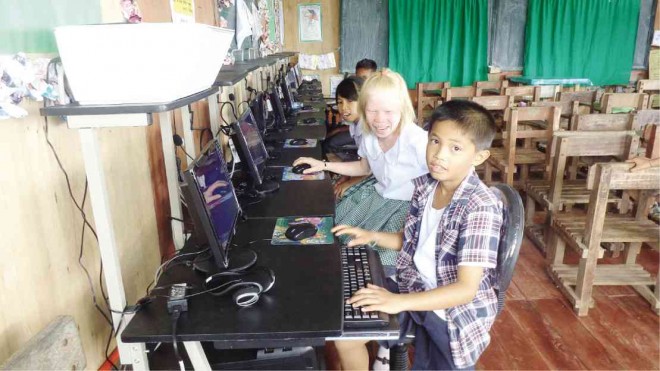Sabang Gibong: Surviving the flood

INSIDE their floating school, students in the village of Sabang Gibong prepare to use their new computers. FRINSTON L. LIM
In Sabang Gibong, children first learn to paddle boats for them to learn how to read and write.
Sandwiched by two rivers, the village is a virtual water world, with floodwater from the Agusan River and tributary, Gibong (pronounced as Hibong), inundating the farming community under over a hundred feet of water several months a year.
At least 1,300 people, majority of them belonging to the Manobo tribe, live in the village, according to village chief Felipa Goloran. They grow corn and other vegetables in rich loamy land and fish for “halwan” (mudfish), “pantat” (catfish) and giant carps in the two rivers.
They sell their produce in the flea market in Talacogon town, over 40 kilometers upriver, where they also buy other household provisions and bring these back to their homes on motorized boats.
Life in Sabang Gibong is laid-back and simple. The village, Talacogon’s farthest, has just recently been reached by electricity through local power distributor Agusan del Sur Electric Cooperative. Solar panels used to energize the community, but perennial flooding and the increasing number of residents required a more reliable power source, village officials said.
Article continues after this advertisementWhile other communities in Agusan del Sur province whine about perennial flooding, villages such as Sabang Gibong find the good in the deluge, said Michael Sabacajan, municipal disaster officer.
Article continues after this advertisement“People have learned to adapt to the flooding by using floating houses that rise and fall with the water level,” said Sabacajan, also an aide to the mayor, Jerry Masendo.
Goloran, the village chief, said that during floods, the floating houses would drift to a forest several hundred meters from their sites, or have to be pulled by motorized boats and securely tied to trees.
With their community tucked deep in the 14,000-hectare Agusan Marsh, schoolchildren in Sabang Gibong do not enjoy the benefits of technology, particularly in education. The 115 students of the village’s elementary school attend classes in a four-room, makeshift, wooden building that sits on bamboo rafts, which float as the water level rises.
“Floodwater could rise above two stories, so we do our classes inside floating houses, the floating birthing center, or at the (floating) chapel, as long as the children are safe,” said Emily Sumipo, head teacher, adding that electricity had to be cut off for many months as a precaution against accidents.
Villagers, particularly the schoolchildren, were already accustomed to the flooding as a way of life, Sumipo said, that they learned to move around on small boats, locally known as “baoto.” “Some children are already adept at paddling their boats while others, especially the younger ones, would be taken and fetched by their parents,” the 30-year-old teacher said.
Sabang Gibong has four elementary school teachers, including Sumipo. With over a hundred children to oversee, teachers need to innovate. Theirs is no easy job.
“A teacher handles two or more classes of different grades at the same time. You have to be flexible, because you deal with children with diverse attitudes, characters, particularly the younger ones. You also have to prepare two or more sets of lectures or class activities for the children,” Sumipo said.
With the dearth of learning resources besetting schools in far-flung areas like Sabang Gibong, teachers have become innovative in keeping children from losing interest in school, or eventually dropping out.
Enlisting the help of parents, Sumipo said, they would conduct feeding programs at least twice a month, feeding the children with vegetable dishes and, occasionally, hotdogs and sausages bought using donated money.
Despite its limited resources, the school was able to hand out notebooks, paper, pens and other school supplies to students, using portions of the school’s maintenance and other operating expenses (MOOE) allocations.
When representatives of energy firm Aboitiz Power visited the village on June 25 and brought several computer sets, everyone in the community was ecstatic.
“The children were elated,” recounted the head teacher. “They were wide-eyed in amazement and eager to get hold of the computer sets. They marveled at the equipment. You could see in their eyes that they were so excited to learn how to use these,” she said.
Sumipo said the donation by Aboitiz would mean “the start of the school being connected to the 21st century.”
“The kids asked me if they could use the computers for playing games, but I told them the electronic equipment were to be used for their studies,” Sumipo said.
“I wanted to touch the computers but I was afraid I might damage them,” said Ariel Culentas, 11, a Grade 5 pupil.
Culentas said he would love to be among the first students to use the new personal computer sets.
Merle Balucos, supervisor for Talacogon West district, where Sabang Gibong is located, said the computers would be useful to teachers in preparing lesson plans, presentations and other paperwork.
Sumipo said she would handle the first computer lessons, while a newly hired teacher-volunteer, 21-year-old Riza Joy Bengil, would become the permanent computer instructor afterward.
For the village, having computers for the schoolchildren was a dream come true.
Manilyn Tormento, a 24-year-old mother of two, said she was happy for her children because they could benefit from using the computers.
Tormento, who did not go to high school and was married at 16, said she was thankful that her children could have the chance to learn using computers.
“In our time, we only had ball pens,” Tormento said, adding that she would love to learn how to use computers if given a chance. “To use Facebook,” Tormento said, laughing.